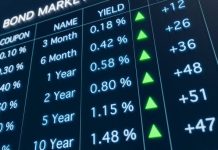Most Asian stocks rose on Monday as markets cheered a tentative deal between U.S. lawmakers to hike the debt ceiling and avert a default, with Japan’s Nikkei racing back to near 33-year highs on improved risk appetite. The Nikkei 225 was the best performer in Asian markets, up 1.4% to its highest level since July 1990. Gains were driven largely by heavyweight chipmaking and financial stocks, as technology shares continued to benefit from expectations that interest in artificial intelligence will drive demand this year. Nvidia Corporation (NASDAQ:NVDA) supplier Advantest Corp (TYO:6857) jumped 5.2% to a record high, and was the top performer on the Nikkei. The broader TOPIX added 1%. Other Asian stocks also advanced on comments from top Democrat and Republican lawmakers that they had reached a tentative agreement to raise the U.S. spending limit, barely a week ahead of a deadline for a U.S. default. The agreement is now set to face a vote in Congress this week, although some policymakers still indicated discontent with the deal. Still, the agreement helped settle weeks of intense negotiations, which had rattled risk-driven markets with the prospect of a U.S. default. A default is expected to have dire consequences for the global economy, triggering a U.S. recession and slamming debt markets.

Australia’s ASX 200 Index Rose 1.1%, While The Taiwan Weighted.
index added 0.9%, with the latter also taking support from gains in heavyweight chipmakers. Philippine shares led gains across risk-heavy Southeast Asian markets, while Singapore-traded futures for India’s Nifty 50 index pointed to a positive open. Still, bigger gains were held back by concerns over rising U.S. interest rates, especially after a hotter-than-expected inflation reading on Friday. Chinese markets continued to lag their peers on persistent concerns over a slowing economic rebound in the country. China’s blue-chip Shanghai Shenzhen CSI 300 index fell 0.4%, while the Shanghai Composite was mildly positive. Hong Kong’s Hang Seng index fell 0.2% after a long weekend. Focus this week is squarely on Chinese manufacturing and services sector data for May, after disappointing figures for April raised concerns over slowing growth in Asia’s largest economy. Data over the weekend showed the country’s industrial profits plummeted in the year to April. China is also grappling with a resurgence in COVID-19 cases, which markets fear could further stifle an economic recovery this year.
















